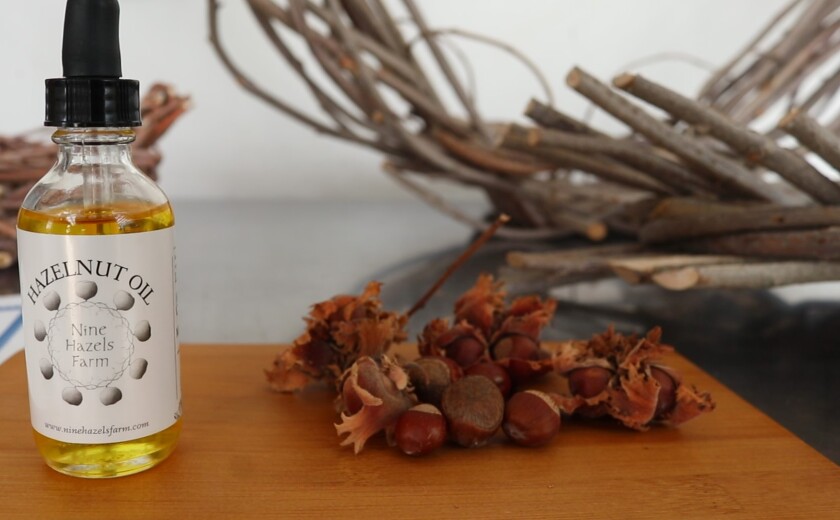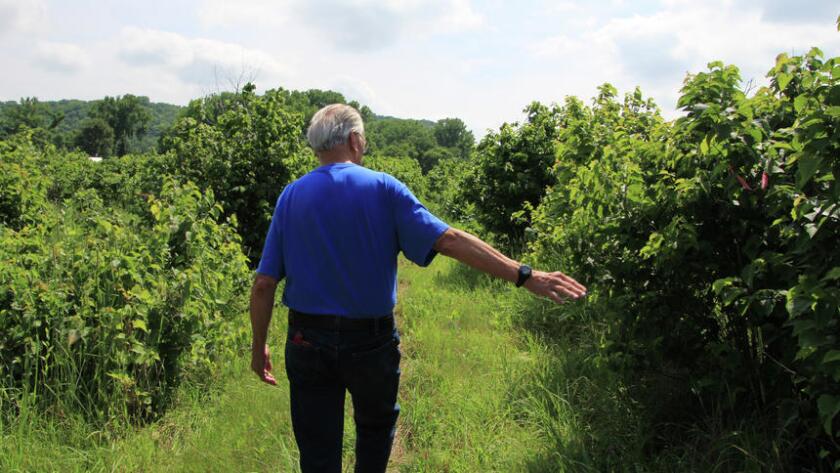LAKE CITY, Minn. — Located along the bluffs outside of Lake City is , a hazelnut farm and nursery that sells fresh roasted hazelnuts, hazelnut oil and other products along with seedlings and seed nuts.
Nine Hazels Farm has been owned and operated by Paul and Sanna Mairet and Sanna's father, Steven Goldsmith, since 2019. The farm was formerly called Hazelnut Valley Farm, ran by Norm and Mary Erickson for 20 years.
ADVERTISEMENT
Paul Mairet said they were shown the ropes by the Ericksons in the year leading up their purchase of the farm, which included around 4,000 hazels and on-farm processing equipment.
"We're able to do things our self a little bit," Mairet said. "But especially now that we're settled — it took a while to kind of get our bearings — we are looking to try and be a little more cooperative and connect with people."
Mairet said they harvest around 100 pounds of edible kernel each fall. The hazelnuts harvested are a cross between the European hazelnut and the native American species.

"We make fresh roasted hazelnuts, usually the week before we go to a market," he said of the Rochester Farmers Market. "We also press some of our harvest for oil, and that's simple, sustainable skin care product."
Hazelnut oil is high in vitamin E and antioxidants, Mairet said.
Coppicing
Most of the hazels on the farm are now aging out of production, Paul Mairet said, so to promote new growth, hazels can be coppiced.
"You can cut these plants to the ground, and then within three years, they resume peak nut production," he said. "A lot of what we're doing right now is kind of rejuvenating a mature growth."
ADVERTISEMENT
A Minnesota Department of Agriculture grant has allowed Mairet to research the market for the wood harvested in the coppicing process.
"I've been researching how the wood works, in terms of its flexibility, and whether you can split it," he said. "Last winter, I finalized a couple of products that we're starting to sell some wreaths during the holidays, and then also some woven traits."
Mairet said the plan currently with the hazels that have aged out of production is to "coppice and reassess."
"We're working with our own genetics, and we've identified five or so plants that are producing really well here," he said.
Profitability
Paul Mairet said it will take time, but he believes they can bring the farm to a point where they achieve profitability, especially through selling seed nuts, seedlings and other crafts.
"As we promote the ecosystem services of hazels and our efforts to do nearly all of our work by hand to disturb the ecosystem less, and limit the use of large fossil-fueled machines, we hope that we can continue to connect with people that are willing and able to pay a premium to support these values," Mairet said.
Enabling a new industry
Colin Cureton is the director of adoption and scaling for the University of Minnesota's Forever Green Initiative, and works with Minnesota farmers who are adopting hazelnuts on their operations.
ADVERTISEMENT
He said that — a spin-off business from the Upper Midwest Hazelnut Development Initiative — identifies four types of hazelnut growers. Homesteader, land steward, botanist and commercial grower.

"I think my answer would be yes for some, and no for others," Cureton said when asked if hazelnuts can be a profitable crop to raise. "So far, we have land stewards, and mostly hobby farmers and a couple commercial growers that are doing champion work."
He said the goal of the is to "enable a new industry."
"To scale production acreage, and build the value chain, and build markets for those products that enable new profitable perennial crops," he said. "That might not be for everyone, but it's definitely for some people that have been waiting on competitive plants that can really yield reliably."
Profitability is just one of the goals for Nine Hazels Farm, Mairet said, and when he and his wife became farmers five years ago, he said they started to "fully understand just how troubled our food and economic systems are."
"Our planet, its non-human citizens, our bodies, our time and more are seriously devalued in the current systems. It is very difficult to achieve conventional profitability without compromising what I realize are unfortunately considered fairly radical values," he said. "No one is paid enough to afford what a pound of carbon-negative, habitat restoring and preserving hazelnuts are truly worth. Instead, we are all paying the price that is coming due for the cheap, planet-degrading food that is all most of us can access and afford."
Hazelnut capital
On May 13, 2010, a Minnesota House of Representatives resolution named Lake City as the Hazelnut Capital of Minnesota, due the Erickson's farm being the first to process and sell a hazelnut product in the state. The resolution serves as inspiration for the owners today.
ADVERTISEMENT
"When we moved out here, Norm showed us the plaque and it had all these dreams and what they were currently doing," Mairet said. "Unfortunately, they weren't able to fulfill everything, and so it's kind of this blueprint of goals for us as we work to kind of keep their dream alive."










